 Petzlover
Petzlover Both Cairland Terrier and Norwich Terrier are originated from United Kingdom. Cairland Terrier may grow 8 cm / 4 inches higher than Norwich Terrier. Both Cairland Terrier and Norwich Terrier are having almost same weight. Cairland Terrier may live 4 years more than Norwich Terrier. Cairland Terrier may have more litter size than Norwich Terrier. Cairland Terrier requires Low Maintenance. But Norwich Terrier requires Moderate Maintenance
Both Cairland Terrier and Norwich Terrier are originated from United Kingdom. Cairland Terrier may grow 8 cm / 4 inches higher than Norwich Terrier. Both Cairland Terrier and Norwich Terrier are having almost same weight. Cairland Terrier may live 4 years more than Norwich Terrier. Cairland Terrier may have more litter size than Norwich Terrier. Cairland Terrier requires Low Maintenance. But Norwich Terrier requires Moderate Maintenance
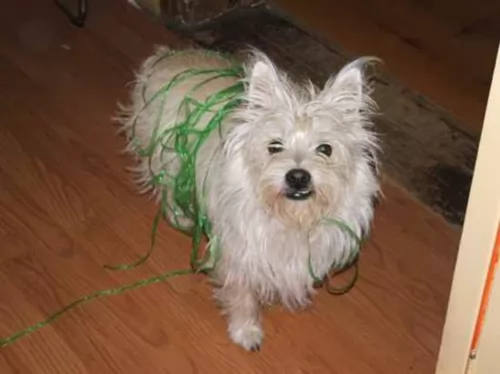 The Cairland Terrier is a cross between the Cairn Terrier and the West Highland White Terrier. It simply means that if you own a Cairland, you’re going to get a little bit of each dog in him.
The Cairland Terrier is a cross between the Cairn Terrier and the West Highland White Terrier. It simply means that if you own a Cairland, you’re going to get a little bit of each dog in him.
This hybrid is a new breed which means you’re not going to get too much documented history on the dog. A tough little hunter of fox and otter, the Cairnland is thought to hail from Scotland.
 Hailing from the United Kingdom and once known as the Cantab Terrier, the Norwich Terrier may be small, but he was bred to hunt rodents.
Hailing from the United Kingdom and once known as the Cantab Terrier, the Norwich Terrier may be small, but he was bred to hunt rodents.
Closely related to the Norfolk Terrier, he is an old dog breed, having existed since the 19th century. Its understandable that such a dog would also be the mascot of Cambridge students.
It is believed that he was bred from Irish Terriers and some believe it came from the Trumpington Terrier, an extinct breed.
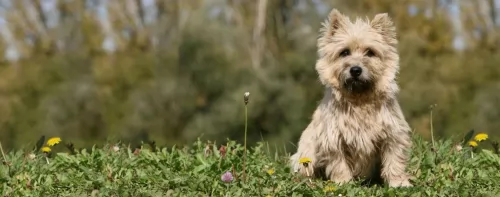 The Cairland Terrier is a small dog standing anything between 20 and 35cm in height and weighing in at roughly 4 to 10kg. He has short legs, a compact little body, while being muscled and strong. He has small erect ears with a shortish upright tail.
The Cairland Terrier is a small dog standing anything between 20 and 35cm in height and weighing in at roughly 4 to 10kg. He has short legs, a compact little body, while being muscled and strong. He has small erect ears with a shortish upright tail.
The color of the medium length coat can be fairly varied which means brown, black, cream, fawn, brindle or even white from the Westie. The dog has two coats with the topcoat being fairly harsh, coarse and straight to slightly wavy while the undercoat is soft.
When it comes to temperament, the Cairland Terrier is social and feisty with a high self-esteem. He has a strong personality and can be somewhat stubborn but he is a great friend of children in the home. He just loves to take part in all their games.
With training and socialization which he undergoes easily, he will get on well with other pets too, although he can become aggressive with other dogs in his territory.
 As one of the smallest terriers, the Norwich Terrier is also quite a rare dog breed. He is such a cute little dog this, weighing just 5 to 5.5kg and standing at between 23–25cm at the withers.
As one of the smallest terriers, the Norwich Terrier is also quite a rare dog breed. He is such a cute little dog this, weighing just 5 to 5.5kg and standing at between 23–25cm at the withers.
He has erect ears and a double coat that can be wheaten, red, tan, black and tan and grizzle. The tail has always been docked previously, giving the dog an attractive, compact look but these days it is left long. These dogs have small litters – usually between one and three puppies.
The Norwich Terrier is a friendly little dog and is essentially a companion to humans. Just because he is small, doesn’t mean he is frail and helpless. He is a feisty, hardy dog with a brave heart and just loves his human family.
The Norwich Terrier is also strong willed and assertive and it can be of benefit to have him trained and socialized. He is energetic too, so he’ll expect a walk each day, a run in the park and ball games. They also make excellent little watchdogs, at least warning you of approaching strangers.
They are good with kids if the children have been taught to be kind and gentle with animals, and they get on well with other pets in the home too.
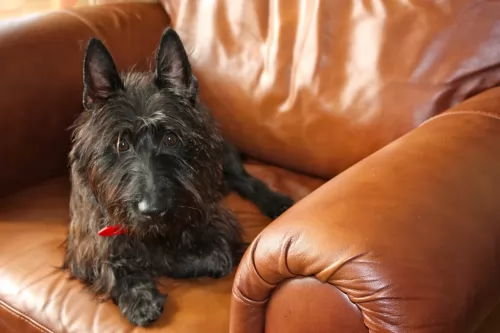 Terriers are dogs that are full of character and self-confidence, and your Cairland Terrier is no different. These small dogs in the Terrier group don’t actively look for a fight with other dogs, but if they are provoked, they aren’t intimidated and will give bigger dogs a piece of their mind. They make splendid pets and will always be ready for a game.
Terriers are dogs that are full of character and self-confidence, and your Cairland Terrier is no different. These small dogs in the Terrier group don’t actively look for a fight with other dogs, but if they are provoked, they aren’t intimidated and will give bigger dogs a piece of their mind. They make splendid pets and will always be ready for a game.
Make sure that your Cairland Terrier remains the feisty little character he is by making sure he gets well looked after. Dogs aren’t known as man’s best friend for nothing, and in exchange for the care you give your Terrier, you’ll be rewarded by a loyal and devoted friend.
 The Norwich Terrier is guaranteed to make you a splendid pet as he is active, friendly, social and intelligent, as well as being loving and loyal.
The Norwich Terrier is guaranteed to make you a splendid pet as he is active, friendly, social and intelligent, as well as being loving and loyal.
You can rely on this little canine friend to want to be with you and take part in all your activities. He won’t do well if you put him in the back yard and forget about him, as he craves human company.
When you do whatever it takes to ensure your Norwich Terrier is an active and treasured member of your family, you’ll be rewarded with a wonderful pet and companion for many years.
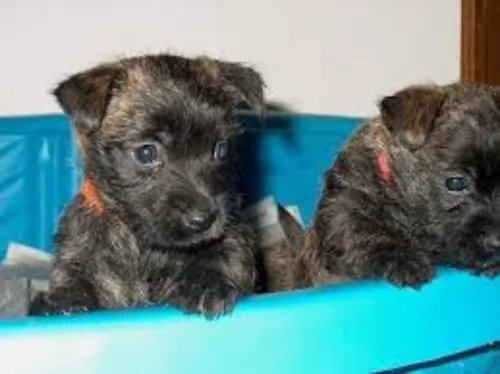 Your Cairland is a tough, feisty little dog and you’re not going to find yourself constantly having to take him to the vet. However even healthy dogs can be affected by ill health, and we look at a couple of illness you want to watch for with your Terrier.
Your Cairland is a tough, feisty little dog and you’re not going to find yourself constantly having to take him to the vet. However even healthy dogs can be affected by ill health, and we look at a couple of illness you want to watch for with your Terrier.
This can be brought on by a change in diet. Usually you can keep food away from your pet for 24 hours, allowing the stomach to empty and to settle. However, if there is blood in the diarrhoea or your dog is vomiting, then veterinary advice must be sought.
Just like humans, a dog can have an allergy to pollen where you see watering of the eyes as well as sneezing. This is because of inflammation of the mucous membranes in the nose. Your vet can ease the problem for your pet.
 The lifespan of the Norwich Terrier is between 11 and 13 years and he is considered a healthy breed. Every dog owner needs to know that there are some health issues which will require veterinary intervention.
The lifespan of the Norwich Terrier is between 11 and 13 years and he is considered a healthy breed. Every dog owner needs to know that there are some health issues which will require veterinary intervention.
Cataracts, an eye disease may be inherited and it is where the eye gets a cloudy look. Other illnesses to look out for include Patellar Luxation, a problem where the dog's kneecap is dislocated from its normal anatomic position. The condition is fairly common in small dog breeds.
Check problems with the teeth - more specifically incorrect bites because of how the teeth meet.
Sometimes these dogs can battle with breathing problems. Upper Airway Syndrome is when the dogs breathing is raspy.
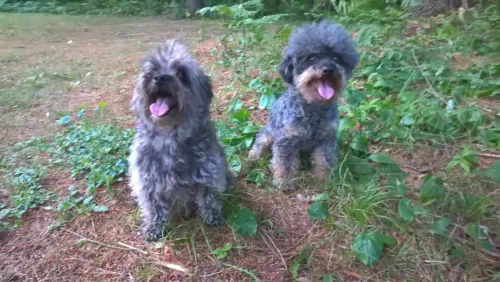 Because the Cairland Terrier is a hybrid breed, the coat can be wiry or soft, but it’s a low maintenance coat. He will need to be brushed twice a week. Some people take their Cairland to have the coat professionally trimmed while others buy a special stripping tool and they strip the hair a couple of times a year.
Because the Cairland Terrier is a hybrid breed, the coat can be wiry or soft, but it’s a low maintenance coat. He will need to be brushed twice a week. Some people take their Cairland to have the coat professionally trimmed while others buy a special stripping tool and they strip the hair a couple of times a year.
Small dogs are prone to dental disease, so you will need to brush your Cairland’s teeth at least two or three times a week. Dental disease is a serious problem with dogs and it won’t only affect the teeth and gums but it can result in infection which can contribute to organ failure. Periodontal disease is always a big problem with little dogs. If you’re not sure how to go about looking after your dog’s teeth, you can always take your dog to the vet for dental check-ups and cleaning.
 Norwich Terriers are active little dogs and were bred to be working dogs – hunting vermin but also accompanying their owners on horseback. You can see that he has been used to an active lifestyle and will require a daily walk and games. He will also want toys which can keep him occupied in between his active sessions.
Norwich Terriers are active little dogs and were bred to be working dogs – hunting vermin but also accompanying their owners on horseback. You can see that he has been used to an active lifestyle and will require a daily walk and games. He will also want toys which can keep him occupied in between his active sessions.
His size allows him to adapt easily to life in the city or the countryside but wherever he is, he will need a good dose of exercise.
The double coated Norwich Terrier, with his wiry topcoat and soft undercoat will need to be brushed twice a week to avoid matting. This is a dog that will require stripping of the old hairs from the coat. This is a process which ensures the coat retaining its texture and appearance.
If you’re in any kind of doubt, speak to a professional groomer. As it is, many owners of this dog who don’t show their dogs, have them professionally groomed.
Always choose a high-quality dry food. Try and avoid those commercially manufactured foods which contain wheat and gluten and lots of preservatives and colorants. These can affect your pet’s health negatively.
Choose quality foods where protein is at the top of the list of ingredients. Give your pet some homemade food too, keeping his diet as simple and nutritious as possible. Some boiled chicken chopped up together with brown rice or pasta and some cooked vegetables such as carrots, sweet potatoes and spinach will do him the world of good.
A tiny bit of raw meat every once and again will be a good thing. Avoid foods such as chocolates, ice-cream, popcorn, onions and spicy foods as these will upset your pet’s digestive system.
Provide him with a warm, dry, soft bed. If he is outside for any length of time, make sure he has a sheltered area away from the sun and rain.